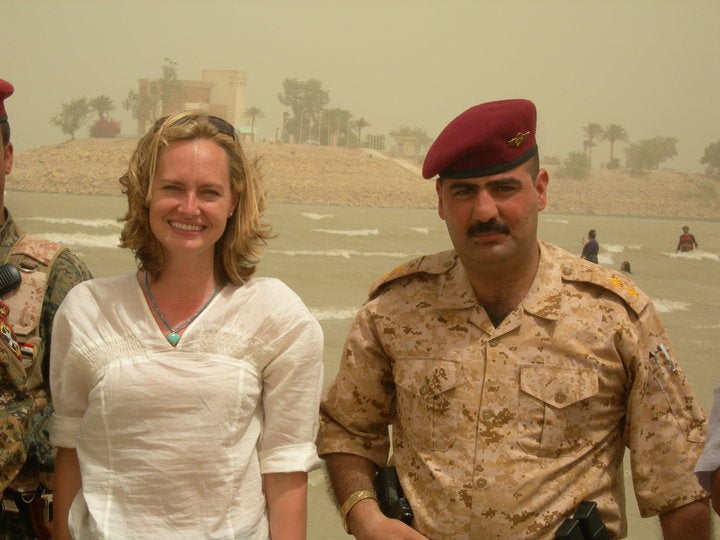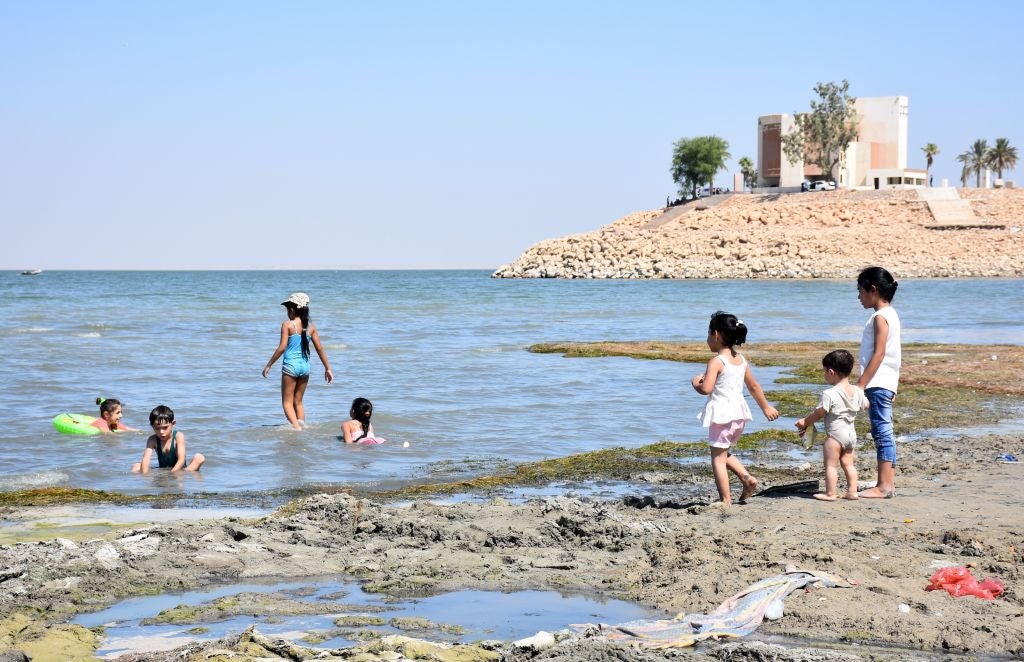Thirteen summers ago, I went to the beach in Iraq.
I was on assignment reporting on post-war reconstruction efforts, and officials from Anbar province arranged an excursion to the sandy shores of Lake Habbaniyah to see a site they hoped to develop – or rather, redevelop – into a tourism hub.
Civilian foreigners were still a rarity at that time in Iraq and international tourists were practically non-existent, so my arrival caused a bit of a spectacle, what with my armed entourage and business-casual attire topped with a flak jacket. However, the local leisure-seekers greeted me with friendly if bemused smiles and a few encouraged me to check out the water. I kicked off my shoes, took off my Kevlar, pulled up my trousers to knee level and waded in.
Two teenage girls asked for photos, then a few families followed suit, creating a waterside receiving line of sorts. Even the severe-looking senior member of my security detail decided to join the fun, stomping into the water in his combat boots and fatigues, posing stoically next to me, his hand all the while gripping the gun on his hip (see image below).

From beaches to bloodshed
Established in 1979 by a French company and located 90km west of Baghdad, Habbaniyah Tourist Village was once a popular vacation spot for Iraqis. In 1986, it won the Gold Cup for the best tourism city from the World Tourism Organisation. That was before the 1990 Gulf War, more than a decade of economic sanctions, the US-led invasion in 2003 and years of ensuing sectarian violence.
The resort, on the day of my visit in July 2009, was a rather forlorn place: facilities were crumbling, the décor was outdated, the lobby of the main hotel building dark and uninviting. Windows were blown out during the fighting and had yet to be repaired, and many of the rooms were left uninhabitable. Bullet holes punctuated many of the walls. Yet the natural setting was an attractive one and it didn’t take too much imagination to picture how it could look with the right makeover.

US Tariffs are shifting - will you react or anticipate?
Don’t let policy changes catch you off guard. Stay proactive with real-time data and expert analysis.
By GlobalDataThe atmosphere at the lakeshore itself was lovely. There were several dozen visitors, dotted all around. Families picnicked, handwoven rugs spread out across the sand and grandmothers fussing over plates of food. Children frolicked in the water.
It was evident Habbaniyah held potential, if only as a destination for domestic tourists.
It was also obvious that Anbar would struggle, perhaps indefinitely, to shed its association with the horrors of its recent past. “Why would anyone go on holiday to or invest in that hellhole?” shrieked online criticism of any discussion around Iraq’s tourism aspirations.
This reaction struck me as unfair and unhelpful. I felt defensive of the families on Habbaniyah’s beach. People have a natural instinct to seek enjoyment – particularly so after suffering the ravages of war. Improvements in security, though incremental, had freed many Iraqis to turn their thoughts to leisure and enjoy the niceties of life again. Western keyboard warriors could turn their noses up at that idea if they wanted to, but who did such cynicism – such sneering – really serve?
Tragically, the cynics won out, at least for a time.
By 2013, Anbar was back in the news for all the wrong reasons and back on the brink of an abyss. Sectarian tensions were firing up again and, as had happened a decade before, would be exploited in horrific fashion by a barbaric terror group.
After a brutal bombardment and ferocious fighting that wrecked the still-recovering city all over again, Ramadi, the capital of Anbar, fell to Islamic State of Iraq and Syria (ISIS) in May 2015.
Habbaniyah Tourism Village, meanwhile, had been turned into a makeshift refugee camp, with 24,000 displaced people living in tents or camped out in abandoned beach chalets or empty resort rooms. There was no electricity or running water and very little food. Many of them had walked hours, risking their lives with every step, to get there. Maybe some of the very same families I had seen picnicking at the waterfront only a few years before were now huddled up there in squalid conditions – back in their tragic roles as war victims. If anything symbolised the brutal death of the dreams of rebuilding Anbar into a peaceful, prosperous place, it was that desperate image.
ISIS managed to take over roughly one-third of Iraqi territory before it was all over. Veritable victory over the group would not come until late 2017. By then thousands of people had been killed, hundreds of thousands displaced, many others enslaved. Anbar again lay in ruins, and the long, slow climb back to normality, and security, began anew.
Habbaniyah reopened to tourists in 2018. It now attracts an estimated 10,000 visitors per year.
Ukraine to tread the same path?
There are parallels, and potential glimpses of the future, for another country with factional politics that has been pilliored by outside influences throughout its history and then invaded by a major power.
Let us hope Ukraine avoids the military defeat and occupation followed by years of insurgency and bloodshed that blighted Iraq. However, in the event of victory, Ukraine will turn its energies quickly to reconstruction, a mammoth task that will require the participation of foreign investors and the support of the international community. The country will need not just capital but also tourists, and a reboot of the visitor economy. That requires an open-mindedness on the part of outsiders.
After a place has dominated international headlines for all the wrong reasons, it takes a long time for the rest of the world to associate it with anything else. It is important to recognise the full impact of war, on places and people. Security considerations are of course important for tourists as well as investors, but if we typecast the people as perma-victims and just write war-torn countries off entirely, we do them a massive disservice.
The very best thing we can do for Ukraine’s war-scarred citizens in the post-war era would be to think of them as much more than that. Everyone deserves their day at the beach.





